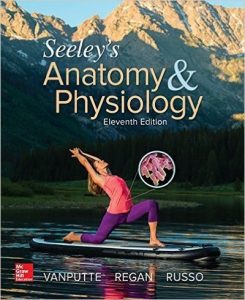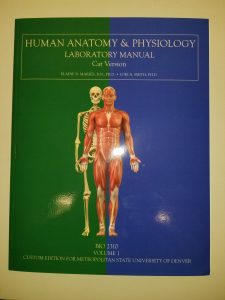Syllabus, Human Anatomy and Physiology I, Spring 2019
Welcome: Welcome to Human Anatomy and Physiology I, BIO 2310. This course combines two sections for lecture, then half of the class meets for lab on Tuesday and the other half meets for lab on Thursday. Labs are in SI 2087. The laboratories are traditional laboratory sessions which allow the seeing, touching and feeling of body structures.
Instructor: Dr. Clare Hays. Office SI 2032; Phone 303-615-0229; Fax 303-556-6426; [email protected]
Office hours: 7:30-9:30 a.m. Tuesdays and Thursdays, 2-3 Tuesdays, or by appointment.
Website: http://sites.msudenver.edu/haysc Here you will find class outlines, lecture objectives (study guides), objective answers, syllabus, lab objectives and PowerPoint slides.
University Catalog Description
BIO 2310-4 Human Anatomy and Physiology I (3+3)
Prerequisite: BIO 1080/1090 or permission of Instructor
This is the first of two courses addressing the structure and function of the human body. Topics include tissues, anatomy, the musculoskeletal system, and neurophysiology. Course content and level are designed for allied health science students and for human performance, sport or recreation professions majors.
TOPICS AND LECTURE EXAMS:
| DATES | TOPICS | READING in Van Putte | |||
| Jan 22 | Introduction/Anatomical Terminology | Chapter 1, Review Chapters 2&3 | |||
| Jan 24 | Membranes & Tissues | Chapter 4 | |||
| Jan 24-29 | QUIZ 1 | ONLINE | |||
| Jan 29 | Skeletal Tissues | Chapter 7 | |||
| Jan 31 | Skeletal System | ||||
| Jan 31-Feb 5 | QUIZ 2 | ONLINE | |||
| Feb 5 | Skeletal System | Chapter 8 | |||
| Feb 7 | Skeletal System | ||||
| Feb 7-12 | QUIZ 3 | ONLINE | |||
| Feb 12 | Articulations | Chapter 8 | |||
| Feb 14 | Articulations/Review | ||||
| Feb 14-19 | QUIZ 4 | ONLINE | |||
| Feb 19 | ASSIGNMENT #1 Due | ONLINE | |||
| Feb 19 | Muscle Physiology | Chapter 9 | |||
| Feb 21 | Muscle Physiology | ||||
| Feb 21-26 | QUIZ 5 | ONLINE | |||
| Feb 26 | Muscular System | Chapter 10 | |||
| Feb 28 | Muscular System | ||||
| Feb 28-Mar 5 | QUIZ 6 | ONLINE | |||
| Mar 5 | Muscular System | ||||
| Mar 7 | Muscular System | ||||
| Mar 7-12 | QUIZ 7 | ONLINE | |||
| Mar 12 | Muscular System | ||||
| Mar 14 | Muscular System/Review | ||||
| Mar 14-19 | QUIZ 8 | ONLINE | |||
| Mar 19 | ASSIGNMENT #2 Due | ONLINE | |||
| Mar 19 | Nervous System | Chapter 11 | |||
| Mar 21 | Nervous System | Chapter 12 | |||
| Mar 21-Apr 2 | QUIZ 9 | ONLINE | |||
| Apr 2 | Nervous System | Chapter 13 | |||
| Apr 4 | Nervous System | ||||
| Apr 4-9 | QUIZ 10 | ONLINE | |||
| Apr 9 | Nervous System | Chapter 14 | |||
| Apr 11 | Nervous System/Review | ||||
| Apr 11-16 | QUIZ 11 | ONLINE | |||
| Apr 16 | ASSIGNMENT #3 Due | ONLINE | |||
| Apr 16 | Autonomic Nervous System | Chapter 16 | |||
| Apr 18 | Autonomic Nervous System | ||||
| Apr 18-23 | QUIZ 12 | ONLINE | |||
| Apr 23 | Sensory Physiology | Chapter 15 & pp. 471-479 | |||
| Apr 25 | Special Senses | ||||
| Apr 25-30 | QUIZ 13 | ONLINE | |||
| Apr 30 | Special Senses | ||||
| May 2 | Special Senses/Review | ||||
| May 2-7 | QUIZ 14 | ONLINE | |||
| May 7 | ASSIGNMENT #4 Due | ONLINE | |||
| May 7-16 | FINAL EXAM (comprehensive) | ONLINE |
Students are responsible for full knowledge of the provisions and regulations pertaining to all aspects of their attendance at MSU Denver, and should familiarize themselves with the policies found on the following web site:
https://www.msudenver.edu/handbook/academicpoliciesforstudents/
- For information on drop dates, see academic calendar or your student detailed schedule
EXAMS AND GRADES:
- 1. QUIZZES and FINAL EXAM: There will be 14 online quizzes; one per week. The quizzes are to be taken online on Blackboard and each one is 20 questions worth 20 points, for a total of 280 points. The final exam is also taken online on Blackboard, is comprehensive over the entire semester, and is 100 questions worth 100 points. Quizzes and the final exam are objective, short answer, or matching questions. These are open-note, open-book exams that are primarily multiple choice format. You may not collaborate with your classmates on any quizzes or the final exam. You can access the exams through Blackboard (msudenver.blackboard.com). You will have 30 minutes hours to complete each quiz and 120 minutes to complete the final exam. However, only one chance to complete it. Online quizzes/exam open at 12:01 am on the date listed above and close at 11:59 pm on the date listed above. If you miss the due date for an online exam, notify your instructor. Late online quizzes will have an automatic deduction of 5 points per day late. A late final exam will have an automatic deduction of 10 points per day late, but will not be accepted at all past May 18, 2019. Click on the exam link, read the instructions, and then click “begin.” You may save your answers as you go, or wait until the end and save all of the answers and then “save and submit.” After it is submitted, click “ok” to view your results to learn from this assessment. There is a practice test that you may try at any time to make sure your web browser is compatible with Blackboard and to get familiar with the format. No points are awarded nor deducted for results on the practice test.
- 2. LAB EXAMS: There will be 3 lab exams each worth 50 points each plus 1 Review Sheets Assignment worth 20 points (170 total). Lab exams will consist of short answer and identification questions. The lab, therefore, will be worth about 1/4 of your course grade. The review sheet assignment consists of completing 1. the Review Sheet in your Marieb Laboratory Manual “Exercise 13 Review Sheet: Gross Anatomy of the Muscular System” PLUS 2. the review sheet on Skeletal Muscle Physiology found here. (Skeletal Muscle Review Sheet) You may do these review sheets at home. The two review exercises are due on your very next lab period when we dissect the brain. 10 points are possible for complete and accurate answers of each review exercise for a total of 20 points.
- 3. ASSIGNMENTS: There are 4 online assignments each worth 50 points. The assignments may be found on Blackboard. The assignments are all open on the first day of the semester, but are due at 11:55 pm. on the dates listed above. Late assignment submission has an automatic deduction of 5 points per day late. You do not have to complete the assignments in one sitting. You may save your answers, log out, and return to work on it later. However, once you hit “save and submit,” you may not work on it anymore.
- 4. POINT TOTALS: The total number of points possible for the course is 750. Letter grades will be assigned on a percentage basis, as follows:
- A= 675-750
- B = 600-674
- C = 525-599
- D = 450-524
- F = Fewer than 450 points
- 5. Late exams and assignments that are taken online will have point deductions as described above.
- 6. Lab exam make-ups MUST be taken within one week of scheduled exam date. Lab exam make-ups are allowed only for extenuating circumstances. If this occurs, I must be notified in person or by phone message BEFORE the exam begins.
Student behavior:
a) The student assumes certain obligations of performance and behavior while attending MSU Denver. Refer to the student standards of conduct in your Student Handbook.
b) Cheating of any sort will result in immediate expulsion with a grade of F.
c) The student assumes certain obligations of performance and behavior while attending Metro State. Refer to the student standards of conduct in your Student Handbook.
d) Cheating of any sort will result in immediate expulsion with a grade of F.
e) Students who disrupt class in any way (which includes whispering to your neighbor) will be asked to leave class.
f) Please turn off cell phones before class.
g) Cell phones and smart watches must be put away during exams and when going over graded exams during class. Taking photos of exams at any point is considered cheating.
Campus closure:
Campus Closure for snow days: Call 1-877-556-3637 for a recording to find out if the campus is closed.
Student Support:
Access Center for Disability Accommodations and Adaptive Technology www.msudenver.edu/access; 303-556-8387; Plaza Suite 122.
Counseling Center (provides help with test anxiety) 303-556-3132; Tivoli 651.
Tutoring Center 303-556-6439; Tivoli 219; online tutoring is free for 20 hours per year at Connect U – click on the student tab to log in for your free tutoring.
COLLEGE OF LETTERS, ARTS, AND SCIENCES
SYLLABUS STATEMENTS – Spring 2019
Students are responsible for full knowledge of the provisions and regulations pertaining to all aspects of their attendance at MSU Denver, and should familiarize themselves with the policies found in the MSU Denver Catalog: MSU Denver Catalog. For more information and recent updates, go to the CLAS website: https://msudenver.edu/las/studentinformation/forms/
Optional statement for faculty to include in syllabi:
RESOURCES
The College of Letters, Arts, and Sciences is committed to, and cares about, all students. To help you manage personal challenges and basic needs security, the university offer several resources. Any student who has difficulty affording groceries or accessing sufficient food to eat every day, or who lacks a safe and stable place to live, and believes this may affect their performance in the course, is urged to contact the Dean of Students (303-615-0220 or 303-615-0423), the Gender Institute for Teaching and Advocacy (303-615-2052), or our CLAS office (303-615-0995 or 303-615-1301) for support.
BIO 2310 Official Syllabus PDF
Specific (Measurable) Student Behavioral Learning Objectives from Official Syllabus (format: l , a, i, ii, etc.):
Upon completion of this course the student should be able to:
Lecture:
- Define common anatomical terms and understand the various levels of organization in the body.
- Explain the components and functions of the skeletal system.
- Explain structure and function of principal joints.
- Explain the relationship between bones and muscles in producing movements of the body.
- Explain the histological characteristics of neurons.
- Describe neuron types and their functions.
- Describe structure and function of skeletal muscle fibers, skeletal muscle tissues, and whole muscle.
- Describe similarities and differences of smooth, cardiac and skeletal muscle tissues
- Describe organization of nervous system.
- Describe functions of brain regions.
- Describe autonomic controls.
- Explain function of the eye.
- Describe auditory and vestibular function.
- Describe taste, touch, olfactory, pressure and thermosensory mechanisms.
Laboratory
- Show skills in dissection procedures.
- Identify bones and major surface feature of the human skeleton.
- Identify major skeletal muscles by name, attachment and function.
- Identify principal parts of central and peripheral nervous systems.


